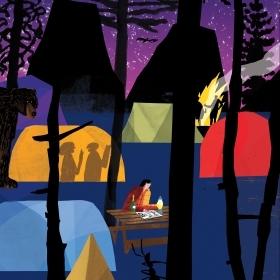One of the most disappointing days of my life was when I found out that Nora Ephron ’62 never wrote the line, “I’ll have what she’s having,” in When Harry Met Sally. You remember the scene: Harry and Sally are sitting in Katz’s Delicatessen, while Sally proves that women can “fake it” by screaming crass orgasmic sounds, causing Harry second-hand embarrassment and fear. The diner is silent, because if you were in a diner where this happened, you’d stop your conversation about how good the french fries are to find out what’s going on, too. A woman says, when a waiter approaches her, “I’ll have what she’s having.” It’s the perfect way to break the silence, a perfect joke to release any (third-hand) embarrassment we feel watching the scene. “I’ll have what she’s having” became a cultural catchphrase you know before you even hear about the movie When Harry Met Sally, so when you hear it from its original source, it’s like seeing a celebrity.
I found out a few months ago that Billy Crystal came up with that line, and I wanted to keep it a secret (from whom? it was public information), because I so desperately wanted to believe that Nora Ephron wrote it.
I first read a book of Ephron essays four years ago. (She died nearly five years ago, and I always thought this was terrible timing—I never got a chance to write her a letter that I, at worst, would never get a response to, but at best, I might get a charming, personal, maybe even funny Nora Ephron note in return.) It was the summer after my first year at Wellesley, and I found her book I Feel Bad About My Neck in the humor section of the iTunes bookstore. I remembered the name Ephron from God-knows-when. I always knew the name but never figured out where I first heard it (sort of like the lyrics to “Piano Man” or, well, “I’ll have what she’s having”), so I read the book.
I read and reread every line and every page and marked quotes I wanted to share with my best friend. I couldn’t get through the first essay describing her neck-hatred without choking from laughter. And that summer, I used my money to buy every single book she ever wrote. I bought Heartburn, and laughed off Ephron’s divorce. I bought Wallflower at the Orgy, and understood how to write interesting interviews. I bought I Remember Nothing, and I realized that if Ephron ever got her Uncle Hal’s money, we wouldn’t have When Harry Met Sally.
Up until that summer, I was a pre-med student, clueless about what I really wanted to do, but after just a few essays by Ephron, I became a “writer.”
“Nora Ephron’s writing makes me want to write,” I’d tell my best friend, who had spent my first year as a pre-med student wanting me to do something creative. She was now elated. I thought to myself, “This fits.” And I started to write in Ephron’s style. I wrote about my first year at a women’s college. I wrote cynical criticisms I had of simple, breakfast-related things. (She hated egg-white omelets; I hate syrup on bacon.) Even if what was coming out onto the page wasn’t Nora, my mind sure was chasing her.
The sentiment I love behind “I’ll have what she’s having” (if I may assign the punch line of a fake orgasm personalized meaning) is Nora-like. It’s a quick observation, a bold declaration, a verbalized want. Even if it wasn’t written by Nora, it sure was chasing her. And I can still rest easy connecting it to her, and to my relationship with this woman who posthumously tapped into my sense of humor and urged me to make my important opinions (on things from my race and culture to my hatred for group lunch orders) known and loud and funny.
I knew that Nora Ephron went to Wellesley. She was an editor for the Wellesley News (as was I), she lived in Tower (as did I), and she left Boston, after graduation, with a job (I’m working on it, OK?). This was a new Wellesley, the one I returned to after my summer of Ephron. It was not just a Hillary Clinton and Madeleine Albright college—no, it was not. But it was for the creative and witty and self-loathing neck haters as much as it was for the academic politicians. I finally found a way to forge a path that could be my own, but wasn’t uncharted territory. It was a path that Nora took once upon a time ago, and it was a path that made me say, “I’ll have what she’s having.”
Broti Gupta ’16 lives in Los Angeles. She is a contributing humor writer for McSweeney’s and The New Yorker.







We ask that those who engage in Wellesley magazine's online community act with honesty, integrity, and respect. (Remember the honor code, alums?) We reserve the right to remove comments by impersonators or comments that are not civil and relevant to the subject at hand. By posting here, you are permitting Wellesley magazine to edit and republish your comment in all media. Please remember that all posts are public.